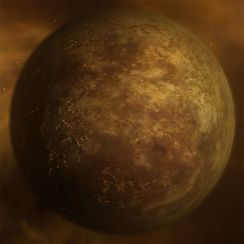Difference between revisions of "Planet Giessen"
From Discovery Wiki
Jump to navigationJump to search (Default message: Importing autogenerated planet page from code generator.) |
m (Pic file fixed. Infocard link & Category added) |
||
| Line 1: | Line 1: | ||
| − | {{Version|4. | + | {{Version|4.91}} |
{{Planet Infobox | {{Planet Infobox | ||
| name = Planet Giessen | | name = Planet Giessen | ||
| − | | image = Giessen.jpg | + | | image = Planet Giessen.jpg |
| owner = | | owner = | ||
| system = [[Omega-54]] | | system = [[Omega-54]] | ||
| − | | sector = | + | | sector = 7C/D |
| house = [[Border Worlds]] | | house = [[Border Worlds]] | ||
| population = | | population = | ||
| Line 15: | Line 15: | ||
| escape_velocity = 2.76 km/sec | | escape_velocity = 2.76 km/sec | ||
}} | }} | ||
| − | Giessen is a small moon orbiting | + | Giessen is a small moon orbiting [[Planet Odense]] on an elliptical path. Influenced heavily by the gravity of the two nearby suns, the small moon is nearly torn apart as it passes next to the larger sun, thus creating large crevices all across it's surface. Giessen consists of a crust of mostly solid carbon believed to cover a substantial core of rock and metal. The core makes up two-thirds of its total mass. |
Revision as of 13:35, 28 November 2018
| Planet Giessen | |
| Location | 7C/D, Omega-54 Border Worlds |
| Technical information | |
| Docking | No |
| Terrain | Barren |
| Diameter | 3,918 km |
| Mass | 3.15 x 10e24 kg |
| Temperature | N/A |
| Escape velocity | 2.76 km/sec |
Giessen is a small moon orbiting Planet Odense on an elliptical path. Influenced heavily by the gravity of the two nearby suns, the small moon is nearly torn apart as it passes next to the larger sun, thus creating large crevices all across it's surface. Giessen consists of a crust of mostly solid carbon believed to cover a substantial core of rock and metal. The core makes up two-thirds of its total mass.
